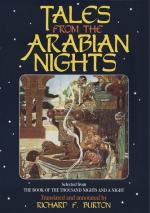[FN#128] The “young person” here begins a tissue of impertinences which are supposed to show her high degree and her condescension in mating with the jeweller. This is still “pretty Fanny’s way” amongst Moslems.
[FN#129] A “swear” peculiarly feminine, and never to be used by men.
[FN#130] In text “’Ala-Akli:” the whole passage is doubtful. [I would read, and translate the passage as follows: “Ma tastahli ’ala haza illa shay la tazann-hu allazi (for “allati,” see Suppl. iv. 197) kayyamtini (2nd fem. sing.) min ’ala akli wa ana zanantu innahu man yujab la-hu al-kiyam; thumma iltifatat illayya wa kalat hakaza sirtu ana la-ghazarat al-thiyab al-wasikhat min al-fakr fa-hal ma ghasalta wajhak?"=Thou deservest not for this but a thing thou doest not fancy, thou who madest me rise from before my food, while I thought he was one to whom rising up is due. Then she turned towards me, saying, “Am I then in this manner (i.e. like thyself) a bundle of clothes all dirty from poverty, and hast thou therefore ("fa” indicating the effect of a cause) not washed thy face?” Or to put it in more intelligible English: “Am I then like thyself a heap of rags that thou shouldst come to me with unwashed face?”—St.]
[FN#131] Of the respect due to food Lane (M. E. chapt. xiii.) tells the following tale: “Two servants were sitting at the door of their master’s house, eating their dinner, when they observed a Mameluke Bey with several of his officers, riding along the streets towards them. One of these servants rose, from respect to the Grandee, who regarding him with indignation, exclaimed, Which is the more worthy of respect, the bread which is before thee or myself? Without awaiting a reply, he made, it is said, a well-understood signal with his hand; and the unintending offender was beheaded on the spot.” I may add that the hero of the story is said to have been the celebrated “Daftardar” whose facetious cruelties have still a wide fame in the Nile Valley.
[FN#132] I would read (for “Sirtu ansa"=I have become) “Sirt’ anta"=thou hast become.
[FN#133] In text “Mukh;” lit.=brain, marrow.
[FN#134] [In Ar. “Wa zand mujauhar fi-hi Asawir min al-Zahab al-ahmar,” which may mean: and a fore-arm (became manifest), ornamented with jewels, on which were bracelets of red gold.—St.]
[FN#135] For this famous type of madman see Suppl. Vol. vi.
[FN#136] [Ar. “Ghurrat,” which may be bright looks, charms, in general, or according to Bocthor, fore-locks. The more usual plural of “Ghurrah” is “Ghurar.”—St.]
[FN#137] In the text “Darajah"=an instant; also a degree (of the Zodiac). We still find this division of time in China and Japan, where they divide the twenty-four hours into twelve periods, each of which is marked by a quasi-Zodiacal sign: e.g.—




